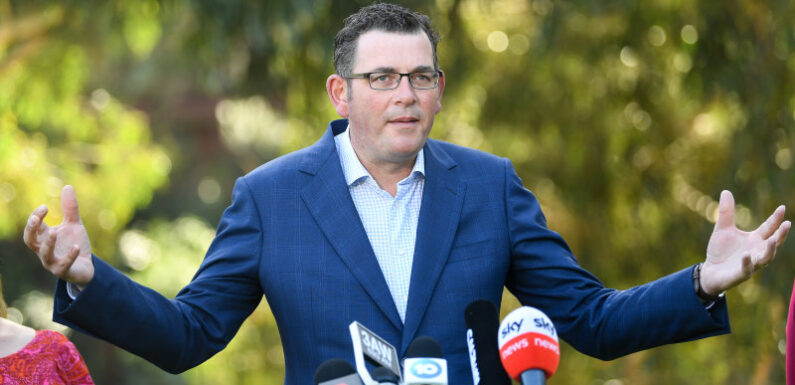
Save articles for later
Add articles to your saved list and come back to them any time.
All those feelings that Daniel Andrews attracted and provoked – the loathing, the devotion – where do they go now? Victorians will have to learn how to live without him. Will his colleagues have a clue about how to run a Dan-free cabinet, a Dan-free communications strategy? Will they be able to get on with each other without him there to keep them all just a little bit frightened?
It’s not just his comrades who are having to adjust. There was a poignancy to Opposition Leader John Pesutto and National Party leader Peter Walsh’s Monday afternoon press conference after Andrews’ resignation. Pesutto framed Andrews as an habitual liar who had trashed Victoria’s reputation for good governance. Walsh said Andrews was always abandoning regional Victorians. But they were bullets fired into the air – the target was already gone.
Premier Daniel Andrews addresses the media on Tuesday.Credit: Justin McManus
Everyone will have to move on and come up with new stories, new attack lines. Yes, the job of politics will go on, the sun will continue to rise each day. But Andrews was one of those leaders who used up most of the oxygen in the room. For all intents and purposes, he was the government.
As he sails off, it’s worth asking just how serious he was with his pre-election promise last year to serve out the full term if re-elected. Few in the media believed it. Retirement is a wicked problem for leaders. The last premier to openly talk about handing over was Jeff Kennett, who spoke in dynastic terms before the 1999 election about training up his ministers to see who could succeed him. He went on to lose the election.
And it’s not as though Victorian voters have shown a willingness to embrace governments headed by midterm replacement leaders. You have to go back 50 years, when the Liberals under Dick Hamer, who had succeeded Henry Bolte the previous year, won the 1973 election comfortably, to find an electorally successful handover. Since then, Lindsay Thompson, Joan Kirner, John Brumby, and Denis Napthine all suffered election defeats soon after taking over the reins.
How much of the Labor vote last year was built on Andrews’ assurance that he wouldn’t be going anywhere? It’s hard to believe it counted for nothing. For some wavering Labor voters, the prospect of continuity under Andrews might well have been decisive in keeping them in the Labor column. Will they now punish the government because Andrews has let them down?
That will depend on how the reconstituted government and the opposition behave in the new environment. Every leader hopes for what Andrews has achieved. He took his party to three elections and won all of them, increasing its lower house numbers every time. He never faced a leadership challenge. Furthermore, he is leaving at a time of his choosing. The last premier who managed to do that was Bolte.
But there is one final test for dominant premiers like Andrews after they depart: have they passed on a capacity to govern to those they leave behind? That term – governance – applies not just to the act of running a government but of overseeing a healthy, responsive party.
Daniel Andrews became nationally recognised during the height of the COVID-19 crisis. Credit: Asanka Ratnayake
In leaving, Andrews takes with him the leader’s capacity to intimidate his colleagues. His office was a massive operation, heavily staffed, and in control of all government messaging. Compared with most other state and territory governments, Victorian ministers had little room to exercise personal autonomy. Mostly, that was a positive for the government because Andrews had highly developed political instincts and was a master communicator. In terms of those raw abilities, he was perhaps the best I’ve seen.
But does he leave behind a vacuum? Unlike previous Labor premiers, he was a factional player and had a substantial role in establishing the ALP’s current cross-factional arrangement, which was made possible by the national executive intervention over branch-stacking in 2020. The pact will survive him, but he will have less capacity to influence its deliberations and activities should he even want to, so its internal dynamics will change too. It could even fall over.
Attachments to politicians – even the ones the media likes to describe as “polarising” – are, in the long run, ephemeral for the simple reason that inevitably they come and eventually, go. Kennett was another big consumer of oxygen, who as premier inspired similarly intense emotional responses from voters. He operated at a higher temperature than Andrews and sought to dominate the media and the public imagination. But when he fell just short of victory in 1999 and subsequently left the parliament, the public moved on and handed the Bracks government a landslide majority at the next election. A more troubling consequence for the Liberal Party was that after Kennett’s period of dominance, it struggled to connect with the public and to attract and develop standout leadership and front bench prospects.
In the months to come, the Dan-haters will transfer their animus to the post-Dan government and find someone new to detest, and the opposition will say it’s all more of the same. The Dan stans will regret his departure and try to stay behind the government, but it will feel different. Other Victorians will pay passing attention and go on with their lives.
Meanwhile, at Spring Street, a strange creation – an experienced government with training wheels attached – will be trying to figure out how much of its old identity to keep and how much to discard.
Shaun Carney is a regular columnist.
The Opinion newsletter is a weekly wrap of views that will challenge, champion and inform your own. Sign up here.
Most Viewed in National
From our partners
Source: Read Full Article

